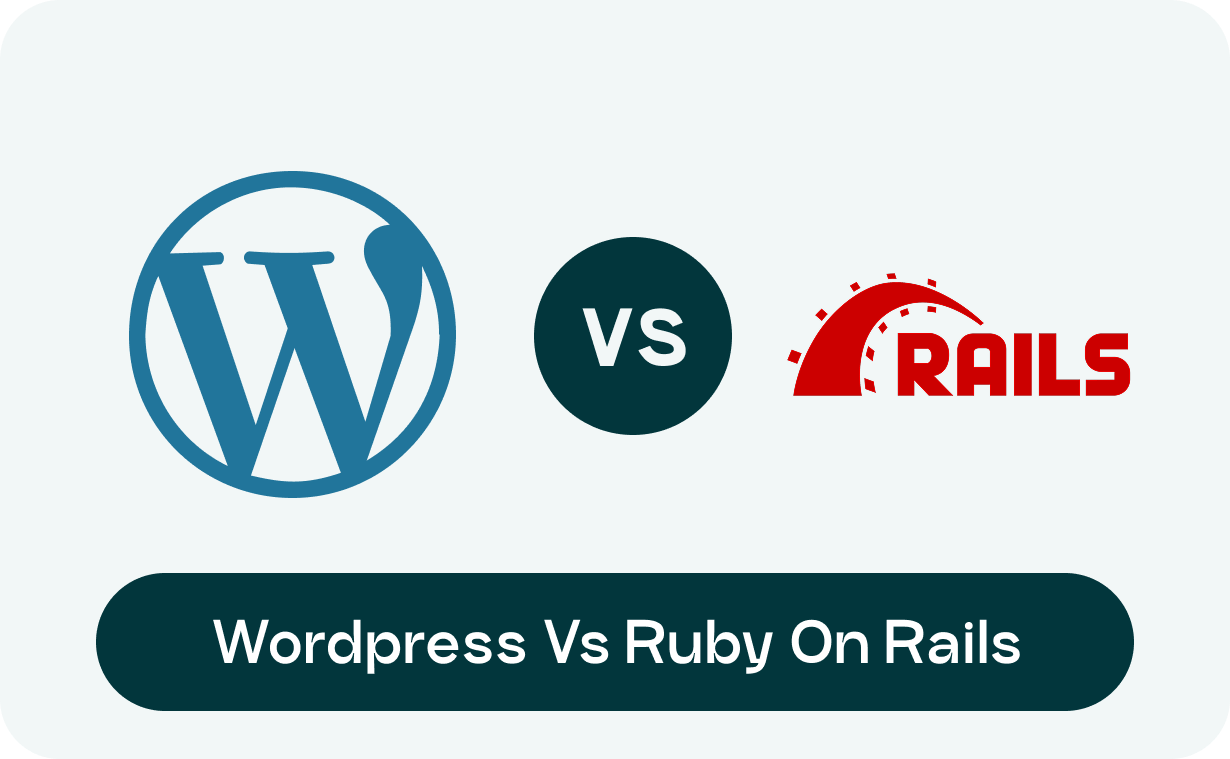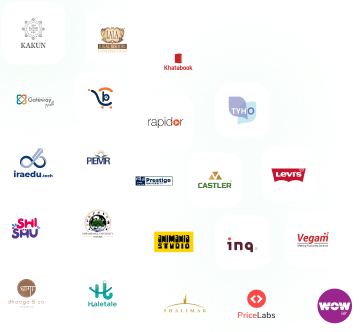When it comes to web development, two powerful platforms, WordPress vs Ruby on Rails, often come up. Both have distinct advantages and are widely used by developers across the world, but they are designed for different purposes. This guide will compare the two based on various factors to help you choose the right platform for your project.
What is WordPress?
WordPress is a free, open-source content management system (CMS) that allows users to create and manage websites without needing to code. It is widely known for its simplicity and user-friendly interface, making it one of the most popular platforms globally, with over 40% of all websites powered by it.
Key Features of WordPress:
User-Friendly: Easy for non-technical users to manage content.
Themes and Plugins: A wide range of themes and plugins to customize the website’s functionality.
Built-in Blogging and CMS: Ideal for managing content, media, and blogs.
SEO-Friendly: Out-of-the-box SEO features with plugins like Yoast SEO.
Large Community Support: A vast community with tons of tutorials, documentation, and help forums.
What is Ruby on Rails?
Ruby on Rails (RoR) is an open-source web application framework written in Ruby, a programming language. Unlike WordPress, which is a CMS, Ruby on Rails is a full-stack framework that helps developers build database-driven, dynamic web applications. RoR follows the MVC (Model-View-Controller) architecture, which promotes organized, scalable code.
Key Features of Ruby on Rails:
Scalability: Ideal for large and complex web applications.
Convention Over Configuration: RoR comes with built-in conventions that speed up development.
Full-Stack Framework: Provides tools for both the front-end and back-end.
Active Record ORM: Simplifies database interactions.
Security: Built-in features for handling common web security issues.
Rich Ecosystem: A variety of gems (plugins) to extend functionality.
WordPress vs Ruby on Rails: A Comparison
1. Ease of Use - WordPress vs Ruby on Rails
WordPress:
WordPress is designed for non-developers. Its intuitive, drag-and-drop interface makes it easy to build and manage websites without any coding skills. You can set up a website with minimal effort using themes and plugins, which take care of most functionality and design.
Ruby on Rails:
Ruby on Rails, on the other hand, is designed for developers who are comfortable with coding. It provides a lot of flexibility, but you must write custom code to build and maintain your website or application. This makes RoR more suitable for developers working on complex projects.
Winner: WordPress (for ease of use)
2. Flexibility and Customization - WordPress vs Ruby on Rails
WordPress:
While WordPress offers a wide range of themes and plugins, it can be somewhat limited if you need deep customization. For more advanced features, you may need to write custom code or integrate third-party services. That said, you can still build complex websites with WordPress, especially if you use custom plugins or themes.
Ruby on Rails:
Ruby on Rails is a fully customizable framework. Developers can build anything from simple websites to complex web applications. With RoR, you're not limited by pre-built themes or plugins, as you have full control over every aspect of the site’s structure and functionality.
Winner: Ruby on Rails (for deep customization)
3. Performance and Scalability - WordPress vs Ruby on Rails
WordPress:
WordPress websites can sometimes become slow due to the large number of plugins, themes, or excessive content. However, with proper optimization techniques such as caching, content delivery networks (CDNs), and high-performance hosting, WordPress can handle moderate to high traffic.
Ruby on Rails:
Ruby on Rails is known for its ability to handle large, complex applications efficiently. It’s particularly well-suited for large-scale web applications that need to scale. However, performance may vary depending on how the application is coded and optimized.
Winner: Ruby on Rails (for scalability)
4. Development Speed - WordPress vs Ruby on Rails
WordPress:
Since WordPress provides many pre-built themes, plugins, and tools, you can get a website up and running very quickly. It’s ideal for building websites with relatively straightforward functionality, like blogs, e-commerce sites, and portfolio sites, without having to write much code.
Ruby on Rails:
Ruby on Rails is also designed for speed, thanks to its "convention over configuration" philosophy. Developers can work faster because RoR handles a lot of the repetitive tasks automatically. However, because it’s more customizable, complex applications may take longer to develop.
Winner: WordPress (for faster development for simpler sites)
5. Cost - WordPress vs Ruby on Rails
WordPress:
WordPress itself is free, but you need to pay for hosting, a domain, and potentially premium themes or plugins. For most basic sites, WordPress is relatively cost-effective. However, if you need custom development, the cost can rise depending on the complexity of the project.
Ruby on Rails:
Ruby on Rails is also free to use, but you’ll likely need to hire a developer if you don't have the necessary coding skills. Development costs for a RoR application tend to be higher compared to WordPress because of the custom coding involved. Additionally, RoR applications may require more expensive hosting solutions.
Winner: WordPress (for lower cost, especially for smaller projects)
6. Security - WordPress vs Ruby on Rails
WordPress:
Since WordPress is so widely used, it is a frequent target for hackers. It’s important to keep WordPress updated and only use trusted themes and plugins to maintain security. Fortunately, there are many security plugins and best practices to help secure your site.
Ruby on Rails:
Ruby on Rails has built-in security features to help protect against common web vulnerabilities, like SQL injection and cross-site scripting (XSS). As long as developers follow security best practices, RoR applications can be very secure.
Winner: Ruby on Rails (for security features)
7. Community and Support - WordPress vs Ruby on Rails
WordPress:
WordPress has a massive community, and there are plenty of resources, forums, tutorials, and plugins available. Its user base is diverse, ranging from beginners to advanced developers, which means you can easily find help for almost any issue.
Ruby on Rails:
Ruby on Rails also has a strong developer community, although it’s smaller than WordPress's. There are many resources available for developers, such as gems, tutorials, and forums. However, since RoR is a more developer-focused platform, you may have to dig deeper for specific solutions compared to WordPress.
Winner: WordPress (for larger, more accessible community)
8. SEO (Search Engine Optimization) - WordPress vs Ruby on Rails
WordPress:
WordPress is very SEO-friendly, thanks to plugins like Yoast SEO that simplify the optimization process. It automatically generates SEO-friendly URLs, titles, and meta descriptions, and you can easily optimize content for search engines.
Ruby on Rails:
With Ruby on Rails, SEO is more manual. While you have complete control over the SEO implementation, you need to configure things like meta tags, sitemaps, and URLs by hand. This offers more customization but requires more effort compared to WordPress.
Winner: WordPress (for ease of SEO)
Feature Comparison Table:
| Feature | WordPress | Ruby on Rails |
|---|---|---|
| Ease of Use | User-friendly, no coding needed | Requires coding knowledge |
| Customization | Limited to themes and plugins | Full flexibility, fully customizable |
| Performance and Scalability | Moderate to high, with optimization | Highly scalable, suited for large apps |
| Development Speed | Fast for simple sites | Fast for custom development, slower for complex apps |
| Cost | Free software, low development cost | Higher development and hosting costs |
| Security | Needs regular maintenance | Built-in security features |
| Community and Support | Large, easy to find resources | Strong developer community |
| SEO | Built-in SEO, with plugins | Manual SEO implementation |
Which is Better for Your Website?
| Criteria | Best Choice |
|---|---|
| Ease of Use | WordPress |
| Customization | Ruby on Rails |
| Performance and Scalability | Ruby on Rails |
| Development Speed | WordPress (for simpler sites) |
| Cost | WordPress |
| Security | Ruby on Rails |
| Community and Support | WordPress |
| SEO | WordPress |
Final Verdict on WordPress vs Ruby on Rails
Choose WordPress if you need a fast, easy, and cost-effective way to build a website or blog, and you don’t want to deal with the complexities of custom coding. Get in touch
Choose Ruby on Rails if you're developing a custom, large-scale, database-driven web application that requires extensive customization, scalability, and performance.
FAQs: WordPress vs Ruby on Rails
1. Can I use Ruby on Rails with WordPress?
While WordPress and Ruby on Rails are separate technologies, they can be integrated using APIs or by linking to each other through custom development.
2. Is WordPress good for eCommerce?
Yes, with plugins like WooCommerce, WordPress is an excellent choice for eCommerce websites.
3. Is Ruby on Rails better for performance than WordPress?
Yes, Ruby on Rails is generally better for performance, especially for complex web applications that require high scalability.
Choosing between WordPress and Ruby on Rails ultimately depends on the complexity of your project, your technical expertise, and the kind of website or application you're building.
Follow us on Facebook to know more about us.
The world’s First zero commission platform
Hire tech partners effortlessly
 If you're a non-tech founder looking for an agency or a tech founder looking for engineers.
If you're a non-tech founder looking for an agency or a tech founder looking for engineers. You can get your 5 best matches from 2800 in 5 mins, with 1000 data points tracked.
You can get your 5 best matches from 2800 in 5 mins, with 1000 data points tracked. Connect directly with no credit card needed!
Connect directly with no credit card needed!
You’re just a click away from the best talent.


